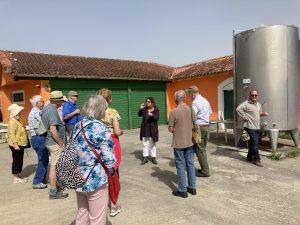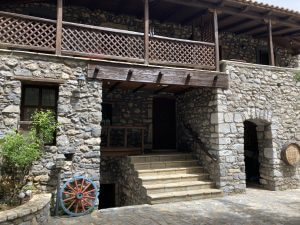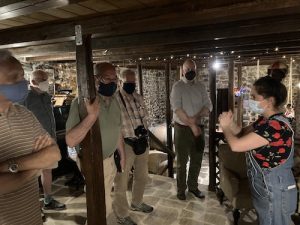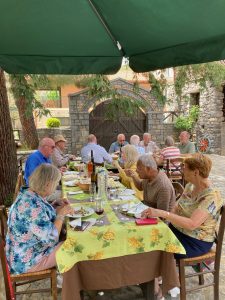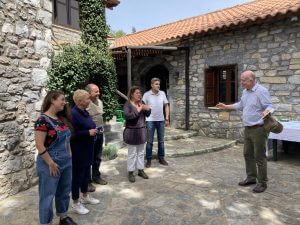Two years after the tour was originally planned to run, a happy group of travellers convened in Athens airport yesterday to commence our first ever tour to Greece.
A couple of hours later, following a photo opportunity at the Corinth canal (incredibly deep, currently closed to shipping) en route to the Peloponnese, we were in the beautiful port town of Napflio, with Greek Orthodox Easter holidaymakers enjoying the harbour side cafés. We settled into our hotel quickly, and assembled in the lobby (wearing our masks, as required currently in Greece in indoor public spaces). A short walk through the crowded streets took us to the 3Sixty restaurant where we had a fabulous meal of Greek salads, fennel tart, mushrooms, beef casserole and a very yummy pudding that completely removed any desire for a quick ice cream on the way home. A white, a red, and a rosé (more than one bottle of each were consumed on the night!) from local wineries completed the meal and many old friendships were re-established and new ones formed over a very convivial meal.
This morning we perhaps wished our wine consumption had been a little lower as we were required by our taskmaster Tim to be in the lobby at 9.20am (7.20am BST), to take the coach for an hour’s journey inland to the Mantinia area. En route Tim described the geography of Mantinia and why it is a location for top quality wine making. Despite its Mediterranean location, altitudes of 500m+ result in cooler temperatures, particularly at night, and a long growing season ensuring grapes develop complex flavours while retaining lovely acidity. Some years it can even be too cold for the grapes to ripen fully!
We were met by Evangelos Kalogris and his daughter Sandi at their small vineyard a few kilometres from the ‘Ancient Mantinia’ heartland. After a welcome slug of Tsipouro, distilled from grape must, we went into the vineyard to learn about the organic approach Evangelos adopted from the moment he planted grapes on his grandparents’ land in 1980. His passion for nature, healthy vines growing in co-operation with the local ecosystem, and determination to do things the ‘right’, rarely the ‘easy’ way was palpable.
Most of the grapes planted are Moschofilero, an indigenous Greek variety with pink skins that produces white and rosé wines, but Merlot and Cabernet Sauvignon are also grown. The vines had only just started to bud – late frosts mean everything is a couple of weeks later than vineyards at lower altitudes.
Hedgerows surround the vineyards – the site is on a flat river valley, surrounded by vines and other crops that are not grown organically, so these provide protection from sprays used in neighbouring farms. The family have two wells, and irrigation is only used for the young vines that are establishing. In the lovely sunshine, with the budding vines growing along side clover and fetches that add to the soil’s fertility naturally, it was a lovely indication of the wines that we were about to taste.
It was a short journey to the village of Kapsia where the Evangelos and his wife Christina live in a traditional homestead. Barrels are stored in the cellar where animals would have been housed during the harsh winters, and Tatiana, Sandi’s sister, explained more about their approach to winemaking, which is as natural as their vine growing. They rely totally on naturally occurring yeasts to ferment the wine, which requires some nerve as fermentation can take a while to get going and may continue well into the early months of the following year. They age their wines for a long time before release, some in French oak barrels, others in bottle, so they are drunk when perfectly ready. Making only 15,000 bottles a year, everything is done by hand (though not by foot – a pneumatic press replacing the foot pressing that was originally done) by the family, with friends helping at harvest.
Our tasting of six wines confirmed that this natural, ‘slow’, approach to winemaking produces some very lovely wines. Moschofilero grapes are made into dry white and rosé, and off dry and medium sweet rosés with beautiful amber/copper colours. An off dry Merlot was a revelation – delicious with the barbecued lamb we had for lunch, while a 80% Cabernet Sauvignon 20% Moschofilero blend produced a beautifully balanced light wine that was freshly aromatic with lovely fine tannins. Tatiana explained that because they do not follow the rules of the local appellation they have foregone the prestigious Mantinia PDO designation, and all their wines are simply classified Wine of Greece, but these were lovely wines with subtle aromas and flavours and great structure. Some are sold through Wanderlust Wines in the UK and I recommend them highly.
We finished our visit with a delicious al fresco Easter lunch of roasted lamb and pork, served by the family. More delicious salads, local cheese and a selection of their wines confirmed how very food friendly they are. While the generosity of the hosts, giving us their time and their hospitality (Sandi’s husband manned the barbecue) confirmed what a special family they are. We left very full, some of us clutching bottles (and jars of Petimezi, a molasses made from grape must), with lovely memories not just of the wine and food but also of the people.
